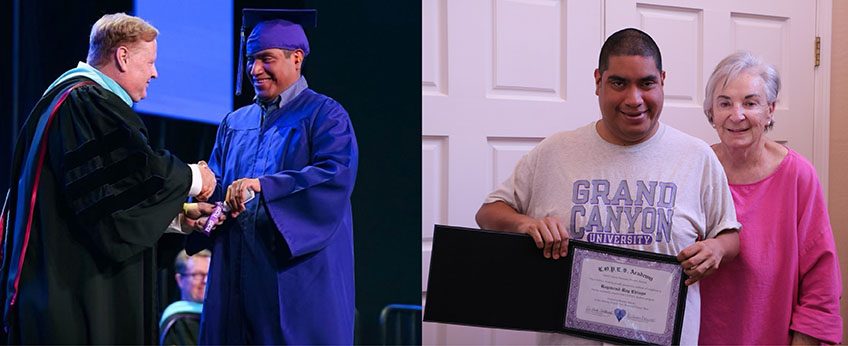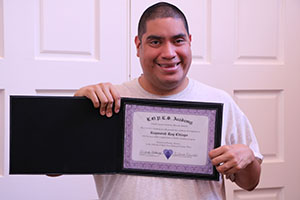From Early Intervention to L.O.P.E.S. Academy Graduation, DDD Member Continues to Exceed Expectations

Ray at his graduation from L.O.P.E.S., and with his mother, Mary Jane.
Ray and his twin brother first came into their foster home when they were 11 months old. The twins were identified as "failure-to-thrive babies," said their foster mother, Mary Jane. "You could put them on a blanket on the floor and they would just stare at the ceiling." The twins had no eye contact, couldn't roll over, didn't smile or laugh. "Early intervention made a big difference!" said Mary Jane.
The DES Arizona Early Intervention Program (AzEIP) is Arizona's statewide interagency system of services and supports for families of infants and toddlers, birth through two years of age, with disabilities or delays. The AzEIP team taught Mary Jane and her husband how to work with the boys in their home. "The boys thought they were playing," said Mary Jane, when in fact, they were learning. As Ray developed and got older, he became a member of the DES Division of Developmental Disabilities (DDD), which supported him throughout his life, and eventually, into his "college" years.

Ray holding his diploma from L.O.P.E.S. Academy.
One morning, a few years ago, Mary Jane woke up early and couldn't get back to sleep. She turned on the radio and heard about a new program, L.O.P.E.S. Academy, offered at Grand Canyon University. L.O.P.E.S. stands for Learning Opportunities for Participation and Engagement in School. The creation of the academy was "inspired by a young woman with an intellectual disability who wanted to have a college experience like her brother and learn skills toward fulfilling employment," according to the University.
After passing the admissions process, Ray was inducted into the two-year program, studying alongside the very woman who inspired the creation of L.O.P.E.S., and the rest of what would become the first graduating class. The non-degree program helped Ray and his classmates with academic, social and job skills development. Each student is assigned a "buddy." Ray's buddy was a GCU theological student. She joined Ray for lunch and social activities, and attended chapel services with him.
During the L.O.P.E.S. program, Ray participated in two internships, one of which–Sodexo, an internal food service company–hired him upon graduation. Now, he works on GCU campus, Mondays and Wednesdays, during the regular semester.
On Thursdays and Fridays, Ray attends a day training program at One Step Beyond, a DDD contracted provider, where he's learning vocational and culinary skills. His One Step Beyond training enabled him to obtain an official Food Handlers card. Both his GCU/Sodexo job and One Step Beyond activities allow Ray to socialize even more. As if his week wasn't full enough, he volunteers with Mary Jane on Saturdays. Recently, they helped to build 188 bunk beds for needy children at Sleep in Heavenly Peace. They also volunteer at Harvest Compassion, a local food bank.
Early intervention and the support of his loving foster parents helped Ray exceed the expectations placed on him when he was designated a "failure-to-thrive baby." Now a productive, caring member of his community, Ray is truly thriving.
Parents and caregivers who suspect their infant or toddler under age 3 is not meeting their developmental milestones are encouraged to connect with AzEIP for an early intervention assessment.

